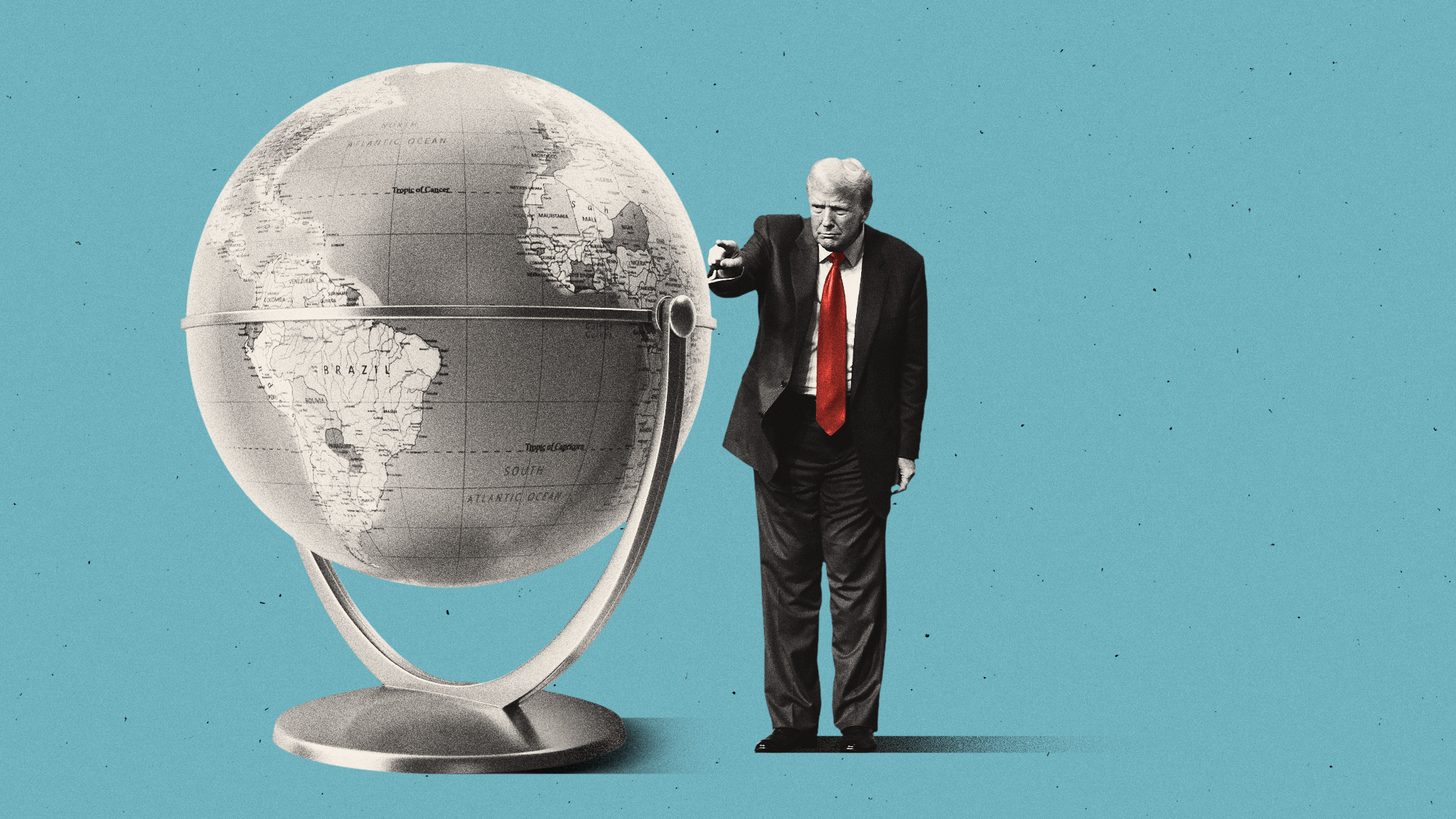Why a national balanced budget amendment would be an epic disaster
Demanding that balance the federal budget each year sounds reasonable. But it's anything but.


In conservative-controlled states across the country, a movement is brewing to amend the U.S. Constitution.
Conservatives are just six state resolutions away from the 34 they need to hold a new constitutional convention. They have the backing of major conservative activist groups, powerful corporate and business donors, and GOP establishment heavyweights like Jeb Bush and John Kasich. And they have a singular aim in mind: requiring the federal government to balance its budget each fiscal year.
Sounds reasonable, right? Everyday American households and businesses have to balance their budgets, at least over the long haul, or risk facing the wrath of creditors and bankruptcy. Why shouldn't the federal government — whose debt seems destined to just keep growing — be held to the same basic standard?
The Week
Escape your echo chamber. Get the facts behind the news, plus analysis from multiple perspectives.

Sign up for The Week's Free Newsletters
From our morning news briefing to a weekly Good News Newsletter, get the best of The Week delivered directly to your inbox.
From our morning news briefing to a weekly Good News Newsletter, get the best of The Week delivered directly to your inbox.
But as sensible as a balanced budget amendment may seem, applying this logic to the federal government would result in an epic, flaming disaster of Hindenburg proportions.
Imagine what your life would be like if you had to ensure that each year you didn't spend any more money than you made in that particular year. How would you ever buy a house or a car? What if your kid had an accident or an illness, piling up medical bills?
The same is true for business owners. How would you buy new retail space or trucks or invest in any big project? Or bounce back if a fire burned down your store?
Governments need the ability to spend big in emergencies and special situations, too, just like you do. And often, that means borrowing money.
A free daily email with the biggest news stories of the day – and the best features from TheWeek.com
But really, you shouldn't think of the federal budget the same way you think of a household or business budget. It's a completely different thing, subject to a completely different set of forces. Why? Because the federal government is utterly unique in its power to control the currency.
This gets a little muddled, because Congress voluntary split this power between the Treasury and the Federal Reserve. But ultimately, they're both parts of the same federal government. And whenever it wants, the Fed can create money and use it to buy government debt, lowering interest rates and effectively transforming that debt from a liability into free money conjured out of thin air.
Households and businesses, by contrast, can't create their own money. So they sit within the forces of the economy, with the health of their own finances waxing and waning along with the business cycles. Even state governments, though they're effectively immortal and have the legal power to raise revenue with taxes, don't control the currency they operate in, and are stuck in the same boat.
Critics view this as a cheat by the federal government that threatens runaway inflation. But it actually allows the federal government to serve a critical role: Whenever the economy fails to create enough jobs for everyone on its own — and it fails a lot — the government can step in and drive us the rest of the way to full employment. Inflation, which is currently rock bottom, doesn't become a threat until we close that gap.
So the federal government has the power to sit outside the forces of the business cycle. It can fill in whatever gaps the economy can't fill on its own, counterbalance recessions, and make sure everyone who can be employed is employed.
The deficit is critical to this. Whatever money the government raises in taxes is money it removes from the economy, just as spending injects money in. Whenever the two flows balance, the government is effectively leaving the economy to its own devices. There are nuances here: Some forms of taxation hurt the job supply more than others, and some forms of spending help more than others. But generally speaking, the degree to which the government is fulfilling its counterbalancing role can be measured by the size of the budget deficit.
This is why the government has nearly always been in deficit. The mid-century period may have featured lower levels of unemployment than today alongside lower deficits, but it also rode the happy aftereffects of World War II — probably the biggest single act of government deficit spending, job creation, and economic stimulus in American history. At the peak of the war effort, the deficit was 26 percent of GDP, and the unemployment rate fell below 2 percent, washing away the damage down by the Great Depression.
But for the last 30 years or so, the economy's ability to heal on its own has all but disappeared, largely because of bad policy decisions. The rise in deficit spending in more recent decades is a symptom of that: The problem hasn't been too much deficit spending; it's been not enough.
As the mid-century also showed us, something important happens when there are so many jobs that employers are competing for workers rather than vice versa. By removing the threat of being left without a job, it gives workers power to demand better wages and benefits, better jobs, better working conditions, and to influence the terms of the employment.
A balanced budget amendment would place that state of affairs permanently out of reach.
It would also condemn the government to sit idly by, regardless of what ups or downs the economy goes through. Every time tax revenue went down, we'd have to slash spending — at the very moment we need more spending to stimulate the economy.
A world in which the U.S. government was constitutionally required to balance its budget every year would be a world with much worse recessions. Recoveries would be agonizingly slow, and there would never be enough jobs for everyone. A balanced budget amendment would guarantee that the unbelievably high levels of unemployment and economic dislocation for black Americans and other racial minorities would grind on in perpetuity. It would condemn all workers to live in constant fear of falling into the pool of unused surplus labor, and thus never fight for a better life.
It's a monumentally irresponsible and destructive idea.
Jeff Spross was the economics and business correspondent at TheWeek.com. He was previously a reporter at ThinkProgress.
-
 The diminishing power of willpower
The diminishing power of willpowerIn the Spotlight ‘Try harder’ attitude may not be the best way to achieve long-term goals
-
 Greenland, Colombia, Cuba: where is Donald Trump eyeing up next?
Greenland, Colombia, Cuba: where is Donald Trump eyeing up next?Today's Big Question Ousting Venezuela’s leader could embolden the US administration to exert its dominance elsewhere
-
 Wilde Cambridge: home-away-from-home in a prime city spot
Wilde Cambridge: home-away-from-home in a prime city spotThe Week Recommends This laid-back aparthotel is the perfect base for a weekend of exploring
-
 Bari Weiss’ ‘60 Minutes’ scandal is about more than one report
Bari Weiss’ ‘60 Minutes’ scandal is about more than one reportIN THE SPOTLIGHT By blocking an approved segment on a controversial prison holding US deportees in El Salvador, the editor-in-chief of CBS News has become the main story
-
 Has Zohran Mamdani shown the Democrats how to win again?
Has Zohran Mamdani shown the Democrats how to win again?Today’s Big Question New York City mayoral election touted as victory for left-wing populists but moderate centrist wins elsewhere present more complex path for Democratic Party
-
 Millions turn out for anti-Trump ‘No Kings’ rallies
Millions turn out for anti-Trump ‘No Kings’ ralliesSpeed Read An estimated 7 million people participated, 2 million more than at the first ‘No Kings’ protest in June
-
 Ghislaine Maxwell: angling for a Trump pardon
Ghislaine Maxwell: angling for a Trump pardonTalking Point Convicted sex trafficker's testimony could shed new light on president's links to Jeffrey Epstein
-
 The last words and final moments of 40 presidents
The last words and final moments of 40 presidentsThe Explainer Some are eloquent quotes worthy of the holders of the highest office in the nation, and others... aren't
-
 The JFK files: the truth at last?
The JFK files: the truth at last?In The Spotlight More than 64,000 previously classified documents relating the 1963 assassination of John F. Kennedy have been released by the Trump administration
-
 'Seriously, not literally': how should the world take Donald Trump?
'Seriously, not literally': how should the world take Donald Trump?Today's big question White House rhetoric and reality look likely to become increasingly blurred
-
 Will Trump's 'madman' strategy pay off?
Will Trump's 'madman' strategy pay off?Today's Big Question Incoming US president likes to seem unpredictable but, this time round, world leaders could be wise to his playbook
